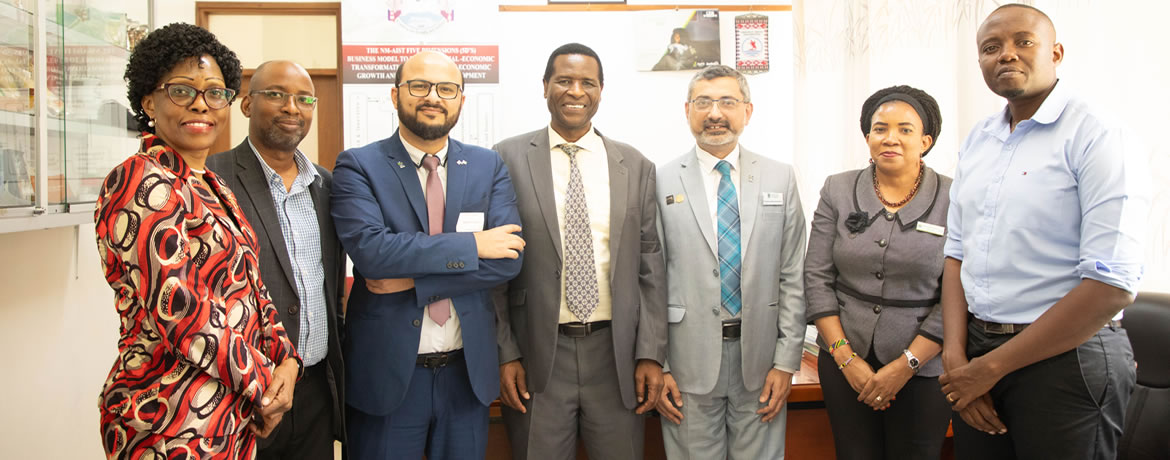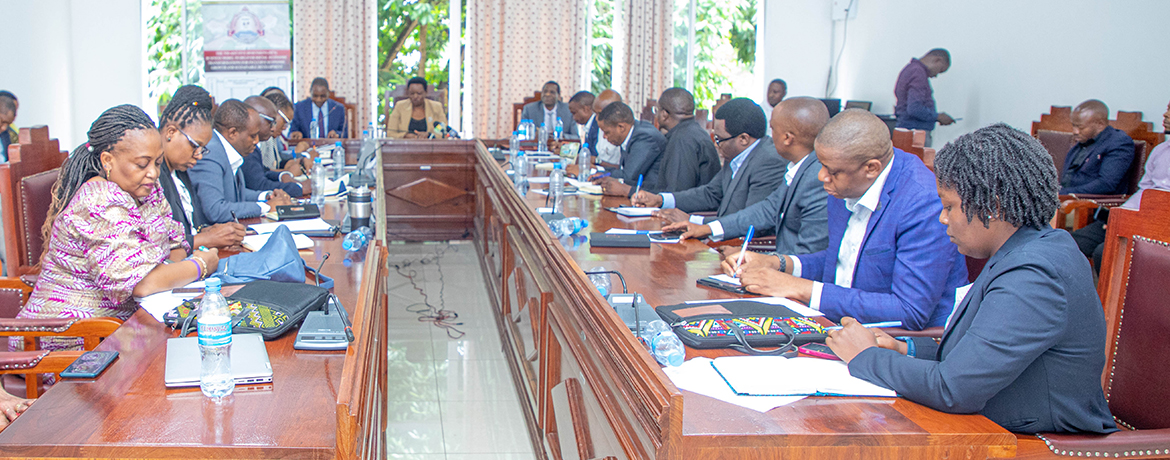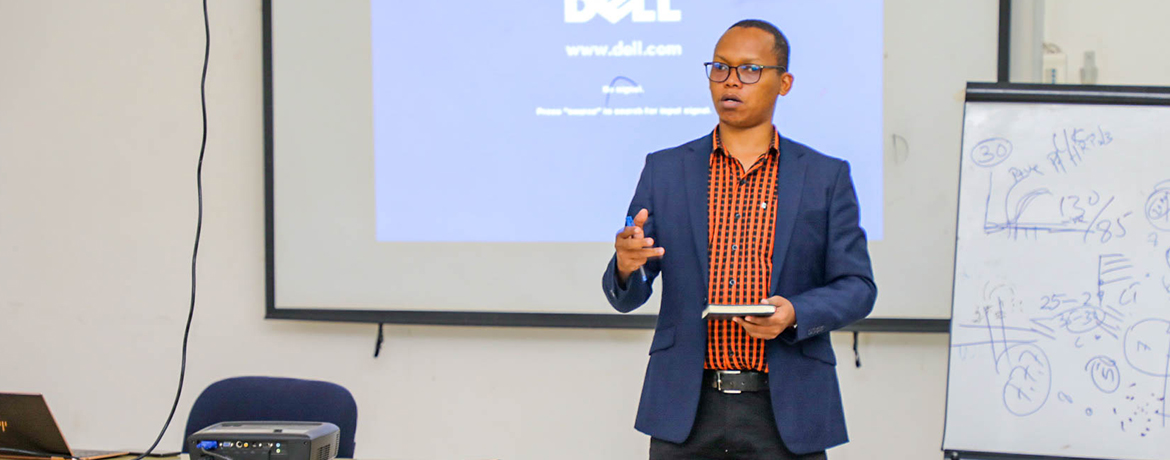The University of Glasgow paid an official visit to NM-AIST on February 7th to explore opportunities for collaboration between the two institutions in which they also had an opportunity to engage in discussion with Prof. Anthony Mshandete, Deputy Vice-Chancellor of Academic, Research, and Innovation, who represented the Vice-Chancellor.
This visit was in line with the insightful discussions that took place at the NM-AIST Conference Hall, where Prof. Qammer Hussain Abbasi and Prof. Imran Muhammad presented research opportunities available at the University of Glasgow.
These professors specialize in IoT( Internet-of-Things) , Communication Sensing, Wireless, and healthcare (ICT application), and their expertise can greatly contribute to the growth of IoT skills and capacity within the NM-AIST community.
Both parties are considering the possibility of establishing a partnership that could include joint PhD programs, staff mobility, student exchanges, research collaborations, and the commercialization of solutions developed through this collaboration. It is worth noting that Prof. Qammer and Prof. Imran from Glasgow, as well as Prof. Shubi and Prof. Kisangiri from NM-AIST, have been supervising Dr. Michael Mollel, an NM-AIST alumnus who is currently conducting postdoctoral research at the University of Glasgow in the UK.
This visit and potential partnership signify a promising opportunity for both institutions to enhance their academic and research capabilities through collaboration and knowledge exchange.
The Government of the United Republic of Tanzania has acknowledged the essential role of Science and Technology in national development, thereby investing significantly in strong infrastructural support within educational institutions specializing in these fields, such as the Nelson Mandela African Institution of Science and Technology.
On December 14, 2023, during an official visit to the institution in Arusha, Professor Carolyne Nombo, the Permanent Secretary of the Ministry of Education, Science, and Technology, emphasized this commitment. She stressed that the government's dedication to fostering an environment conducive to technological advancement by ensuring a continuous transition of innovations from research to market viability. Professor Carolyne highlighted the strategic investment in the commercial sector, aiming to facilitate the entry of technologies developed by researchers into the market through collaborations or subsidiary initiatives.
"The government, through costech, allocates annual funds to enhance various technologies crafted by our researchers and designers. Our objective is to refine these innovations, making them market-ready and capable of addressing societal challenges," Professor Carolyne stated. Furthermore, emphasizing the educational sector's broader vision, Professor Carolyne outlined plans to promote educational tourism. The initiative aims to attract diverse visitors to educational institutions, offering insights into innovative advancements across various sectors.
"In many instances, individuals traveling abroad engage in educational tourism by visiting educational or research institutions. Tanzania seeks to facilitate such educational tourism, thereby strengthening the arrival of tourists keen on exploring our nation's educational landscape," added Professor Carolyne Nombo.
During the visit, Vice Chancellor Professor Maulilio Kipanyula clarified the purpose behind Professor Carolyne's visit, was firsthand insights into the institution's activities by touring the Teaching and Research Laboratories, along with the Incubation Centre, to witness the diverse variety of innovations generated by the institution.
On November 29th, a delegation from the Ministry of Agriculture paid a visit to the Nelson Mandela African Institution of Science and Technology (NM-AIST) to explore potential collaborations in Artificial Intelligence (AI) projects spearheaded by Dr. Neema Mduma. The primary focus of this initiative is to harness AI tools and technologies aimed at enhancing agricultural productivity and sustainability, specifically in diagnosing and managing pests and crop diseases in Tanzania.
This visit aligns with the Tanzanian government's growing acknowledgment of the transformative power of emerging technologies like AI within the agricultural sector. AI holds the promise of automating tasks, refining data collection and analysis methods, and generating novel insights crucial for crop yield optimization, as well as effective pest and disease control strategies.
Throughout the visit, Ministry officials engaged with Professor Maulilio Kipanyula, the Vice-Chancellor of NM-AIST, and the proficient team steering the AI project.
Prof. Maulilio Kipanyula, Vice Chancellor of the Nelson Mandela African Institution of Science and Technology, emphasized the pivotal role of drafting productive projects as the primary means of generating internal income for the institution.
During a meeting with the institution's employees in Arusha on December 4, 2023, Prof. Kipanyula highlighted, "The composition of substantial, high-yield projects stands as a key avenue for augmenting our institution's revenue. Winning and securing these projects significantly bolsters our income, making it imperative for our researchers to approach this task with utmost diligence."
He stressed that the institution's progress hinges on the collaborative efforts between employees and management aimed at enhancing the institution's well-being.
"I urge you to operate on the principles of integrity, excellence, unwavering dedication, and consistency to not only attract local clientele but also to foster a positive reputation for our institution," he emphasized.
The Centre of Excellence for ICT in East Africa (CENIT@EA) at NM-AIST in Arusha, Tanzania, is conducting a four-day Summer School from November 20th to 24th, 2023, with theme "Commercialization in the Age of Technology," aims to equip participants with the skills and knowledge necessary to successfully introduce new products and services to the market.
During the opening of the Summer School Dr. Mussa Ally Dida, the Dean of the School of Computation, Communication Science, and Engineering, expressed NM-AIST's commitment to nurturing scholars in transforming their ideas and prototypes into viable businesses.
"NM-AIST is an international institution that attracts scholars from almost all African countries. Our goal is to provide them with international exposure, bringing in diverse expertise from around the world through conferences and workshops," Dr. Mussa Ally Dida commented.
Mr. Jumanne Mtambalike, the CEO of Sahara Ventures and the facilitator of the event, emphasized that the commercialization of products and services through digital transformation hinges on understanding consumers' needs and utilizing the right brand ambassadors for enhanced business success.
CENIT@EA at NM-AIST aims to expose participants to various stages of the commercialization process, guiding them from ideation to product launch.







